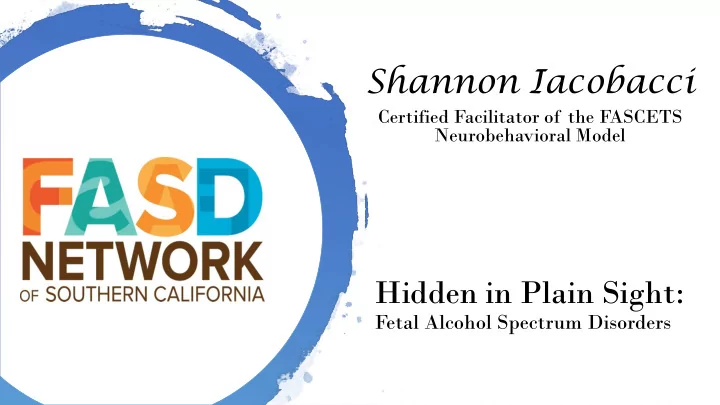

Shannon Iacobacci Certified Facilitator of the FASCETS Neurobehavioral Model Hidden in Plain Sight: Fetal Alcohol Spectrum Disorders
WHO AM I?
What did your brain have to do for you to show up to this session today? Let’s consider what our brain does for us every day
Brain Tasks What does your brain do for you every day? Plan, organize, abstract, predict Use language, communicate Make decisions, manage money, plan time Multi-task, think fast Manage emotions Adapt to changes Manage sensory systems
What is FASD? • Fetal Alcohol Spectrum Disorder • Umbrella term that describes a range of effects that can result from prenatal alcohol exposure • FASD is NOT a diagnostic term • It is NOT visible
Physical Impact of Prenatal Alcohol Exposure 1 . Brain Structure 2. Brain Function 3. Central Nervous System 4. Heart, skeletal, kidney, ear and eye malformations 5. Circadian rhythm and gut microbiome
1 in 20: More than autism • California Public Schools: • Approximately 6.2 million students enrolled for the • 2017-2018 school year • This means about 310,000 students potentially have FASD • Prevalence of Fetal Alcohol Spectrum Disorders in 4 US Communities by Christina Chambers and Philip May, et al JAMA.2018;319(5):474- 482.doi:10.1001/ja,a.2017.21896
Potential Signs of an Invisible Disability • Delayed Development • Intellectual Disabilities • Learning Disabilities • Neuro-Behavioral Disorders • Motor Abnormalities • Language Disabilities • Tactile and Auditory Sensitivity • Difficult to Soothe • Processing Difficulties • Trouble Learning Rules • Memory Difficulties
FASD Effects Each Person Differently
1. Identifies a brain-based physical condition 2. Pivotal: From symptom to source Importance of 3. Reframes the meaning of behaviors: From won’t to can’t Identifying 4. Redefines the problem FASD 5. Redefines solutions 6. Key for prevention
Assumptions and Comparisons Expectations FASD/Neurobehavioral Think Fast, Listen Fast Can Process Slowly Predict, Plan Ahead Can have difficulty predicting Multi-Task, Prioritize One Task at a time Learner, Remember, Apply Information Memory Struggles Inhibit Impulses Impulsive Manage Sensory Input Easily Overstimulated Problem Solve Difficulty Problem Solving Appropriately Manage Emotions Difficulty managing emotions
Neurobehavioral Disorders-One or more challenges in these areas and others • Difficulty with transitions/change • Sensory Issues • Memory Difficulty • Inability to regulate emotions Neurobehavioral • Difficulty interpreting actions/words of others • Slower processing speed Disorders • Abstract thinking- Language, Math, Time • Focus/attention • Sitting still • Multi-tasking • Interpreting visual cues
The Importance of Recognizing Strengths • Musical or artistic talent • Curiosity • Spontaneous • Athletic skillset • Mechanical and construction skillsets • Love of animals or the outdoors (gardening, fishing, etc.) • Generous helpful, have a nurturing ability • Cognitively advanced in some areas • Loyal, friendly, affectionate, trustworthy, gentle
Potential Overlapping Diagnosis Oppositional Defiant Disorder FAS/ARND/ARBD ADHD AUTISM Reactive Attachment Disorder ND-PAE SPD PTSD FANB Pervasive Developmental Static Encephalopathy Disorder Chronic Dysmaturity Learning Disabled Intermittent Explosive Disorder (IED) Bi-polar Disruptive Mood Dysregulation Borderline Personality Disorder (DMDD) Disorder
• New routines (transition/change) • Isolating • Online/distance learning The Effects of • Online therapy sessions • Wearing masks COVID-19 • Parks/playgrounds closed • Restaurants & Entertainment closed • No gatherings outside of family – no friends
• Initial Calmness • Peaceful The Effects of • Less Pressure and stress to get Covid-19 on ready to perform tasks • Smoother transitions – Not as big or Mental Health as many
• Increased Anxiety/Depression • Inability to focus • Higher inability to regulate The Effects of emotions • Resistance/Defiance to wearing Covid-19 on masks (sensory) • Ineffective teletherapy sessions Mental Health • Higher Frequency & Intensity of Dysregulation/Outbursts • Rise in suicidal thoughts/suicide
Ideas to help • Routine • Accommodate • Front load information • Provide energy outlets • Remember it’s NOT personal • Remember Can’t vs. Won’t • Validate feelings • Be flexible • Most Importantly, Stay Calm- An escalated adult can never calm down an escalated child/person
Self Care • Crucial for caregivers to take care of themselves • Remember, when we care for ourselves, we can be more calm in situations that require us to be • What does self care look like for you?
REMINDER • FASD is a brain based PHYSICAL disability. • When we provide the right supports, the person effected by FASD can succeed with confidence and less frustration
Shannon Iacobacci Certified FASCETS Facilitator of the NeuroBehavioral Model ibshandee@gmail.com
• Provide support to parents, foster, and relative caregivers of FASD affected individuals from birth through adulthood in the 10 southern counties • FASD Resource and Training for families, A 501 (c) (3) Nonprofit Organization individuals, and professionals • Grassroots, all volunteer members
Recommend
More recommend